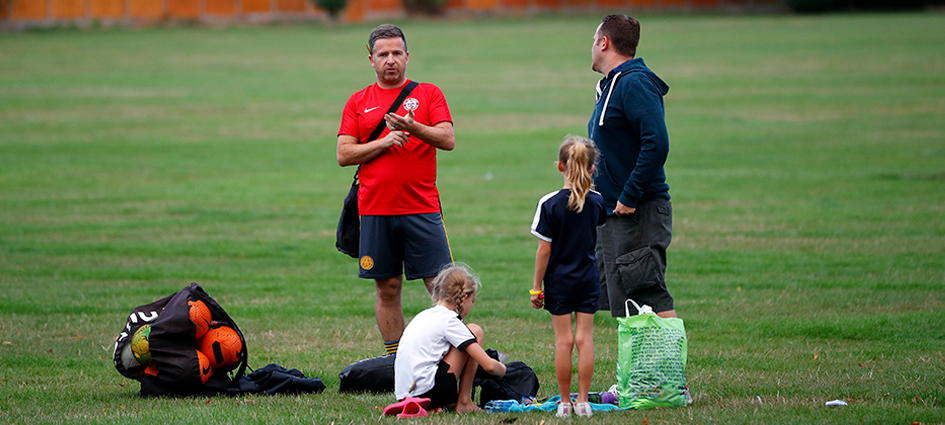
Engaging parents: it’s not ‘us and them’
- Rebecca Garlick
- 22 May 2019
FA county coach developer, Rebecca Garlick, discusses the importance of engaging parents* in the coaching process and the crucial role they can have on the development of young players.
1. Parental significanceParents are, in the majority of cases, the most important people involved in a young person’s life. From a young age, children trust their parents and follow their lead. As coaches we have to recognise this and appreciate that parents have been involved in their child’s journey for far longer than we have. Therefore, it is in our best interest to invest the time in connecting and building relations with the parents of our players.
2. A variety of challengesAs a coach you will meet lots of different parents all with their own unique personalities, intentions and approaches. Although some of these will be challenging, identifying underlying motivations can allow for more effective communication between coach and parents. For example, a parent who is unhappy at their child being played in goal when they think they are a centre midfielder, may respond positively to hearing: “I have recognised how good Jake is with his feet and I believe he could have some real impact in the game utilising his passing skills to create chances for us in attacking areas”.
3. Show them that you careThe priority for most parents is that their child is safe, valued and involved. If coaches can demonstrate this, a positive connection with parents can be created. Another way is recognising the different circumstances parents face and the things that are of value to them. Parents may have other children to support as well as leading their own busy lives. Ensuring your sessions start and finish on time can make a huge difference and demonstrates that you care about the parents as well as well as their child.

4. Share your expectationsParents, like coaches, have all been influenced by a variety of environments and experiences in football. As a result, if we fail to outline our expectations for the environment we’re working in, we can’t expect others to know how to behave within it. Sharing our coaching and playing philosophy can help to provide a framework and justification for those expectations, as well as giving parents an opportunity to find an alternative environment for their son or daughter if they don’t agree with the philosophy outlined.
5. Positive influence You can positively influence parents’ behaviour by setting tasks and responsibilities in the way you do with the players. For example, on matchdays you might share individual player objectives with each parent and ask them to pick out and feedback positive examples of where their child has achieved this during the game.
6. Managing behaviourThe excitement and passion of matchday (and sometimes training) can result in parents demonstrating challenging behaviours. Working with ‘influential’ parents is one way you can help manage this. Influential parents are usually the ones organising external social activities, making conversation and bringing the half-time refreshments. These parents can be effective in helping to spread key messages and calling out certain behaviours that are deemed unacceptable within the environment.
It’s important that parents feel valued and that they have a contribution to make
7. Give them a voiceInvite one or two parents to provide feedback on how they feel the club is being run and if it is meeting their expectations. If they feel they have a voice and it is being listened to it can help develop a more effective environment for all involved.
8. Involve themOne of the best pieces of advice I have been given was to conduct my team-talk near the parents, rather than at the other end of the pitch. Initially, I was worried that they would interfere, but with some clear expectations it had the opposite effect. Instead, I was able to influence positive conversations between parent and player. Highlighting the areas the players have done well in and asking key questions to prompt reflection can shift discussions away from the end result and towards learning.
9. The art of delegation It’s important that parents feel valued and that they have a contribution to make. One way you can do this is by delegating certain responsibilities. The parents of your players may possess key skills that can be utilised and might just be waiting to be asked. Having some support from parents will enable you to focus on what you’re there to do: help the players to get better.
The above article was inspired by Greg Winkler’s presentation at the 2019 NSCAA conference in Chicago.
*The term parents is used here as an inclusive term to include guardian and carer.


